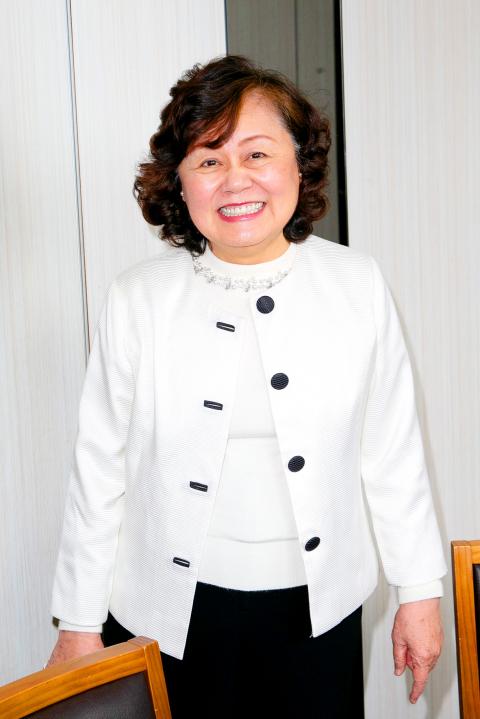Formosa TV (FTV) shareholders yesterday selected Wang Ming-yu (王明玉) to replace Kuo Bei-hong (郭倍宏) as the network’s new chairwoman.
The network held an extraordinary shareholders’ meeting in New Taipei City’s Linkou District (林口) after its board of directors on March 14 voted to dismiss Kuo.
During the board meeting, Kuo had reportedly failed to clearly explain the whereabouts of NT$500 million (US$16.21 million) that he and other members of the board had borrowed from banks under the network’s name.

Photo: Chen Yi-kuan, Taipei Times
He was also accused of supporting the production of a series of unpopular political talk shows, which he allegedly used to promote his political agenda, rather than to generate profits.
Kuo has since held several news conferences, saying that he had returned the money to the network’s account and would resign from his position.
Yesterday’s meeting selected 21 board directors, from which seven managing directors were chosen.
Wang, who is among the new managing directors, was elected chairwoman, while Formosa Investment Co chairman Huang Ming-chan (黃明展) was elected vice chairman.
Formosa Investment is FTV’s largest shareholder.
Former FTV chairman Tien Tsai-ting (田再庭), who attended the meeting as a honorary director, said that yesterday’s meeting was illegal.
“Wang should remember that she was not supposed to betray FTV’s founding purpose. Before the meeting, I chose to say nothing. However, seeing that shareholders could not voice their dissent during the meeting made me think that Kuo was right all along,” he said.
“Wang and Formosa Investment have planned for this to happen, and it took them only three minutes to depose Kuo. It was really uncivilized of them to monopolize the microphone during the meeting,” Tien said.
Based on the shareholders’ decision, Wang’ tenure is to end on April 1, 2022.
The shareholders also voted to cancel an annual shareholders’ meeting on May 9 that had been scheduled by the previous board.
Wang told reporters that the extraordinary meeting was held legally and followed due procedures.
Asked who the company’s new president would be, Wang said that the person must be a professional who understands the television industry.

A strong continental cold air mass is to bring pollutants to Taiwan from tomorrow, the Ministry of Environment said today, as it issued an “orange” air quality alert for most of the country. All of Taiwan except for Hualien and Taitung counties is to be under an “orange” air quality alert tomorrow, indicating air quality that is unhealthy for sensitive groups. In China, areas from Shandong to Shanghai have been enveloped in haze since Saturday, the ministry said in a news release. Yesterday, hourly concentrations of PM2.5 in these areas ranged from 65 to 160 micrograms per cubic meter (mg/m³), and pollutants were

Taiwan’s armed forces have established response protocols for a wide range of sudden contingencies, including the “Wan Chun Plan” to protect the head of state, the Ministry of Defense (MND) said today. After US President Donald Trump on Saturday launched a series of airstrikes in Venezuela and kidnapped Venezuelan President Nicolas Maduro, concerns have been raised as to whether China would launch a similar “decapitation strike” on Taiwan. The armed forces regularly coordinate with relevant agencies and practice drills to ensure preparedness for a wide range of scenarios, Vice Minister of National Defense Hsu Szu-chien (徐斯儉) told reporters before a

EVA Airways on Saturday said that it had suspended a pilot and opened an investigation after he allegedly lost his temper and punched the first officer several times as their plane was taxiing before takeoff at Los Angeles International Airport. According to a report published on Thursday by The Reporter, the incident occurred after the flight’s Malaysian first officer tried to warn the Taiwanese pilot, surnamed Wen (文), that he was taxiing faster than the speed limit of 30 knots (55.6kph). After alerting the pilot several times without response, the first officer manually applied the brakes in accordance with standard operating

NOT AN OPENING: Trump’s violation of international law does not affect China’s consideration in attacking Taiwan; Beijing lacks capability, not precedent, an official said Taiwanese officials see the US’ capture of the president of Venezuela as a powerful deterrent to Beijing’s aggression and a timely reminder of the US’ ability to defeat militaries equipped with Chinese-made weapons. The strikes that toppled Venezuelan President Nicolas Maduro signaled to authoritarian leaders, including Chinese President Xi Jinping (習近平), US President Donald Trump’s willingness to use military might for international affairs core to US interests, one senior official in Taipei’s security circle said. That reassured Taiwan, the person said. Taipei has also dismissed the idea that Trump’s apparent violation of international law could embolden Beijing, said the official, who was not